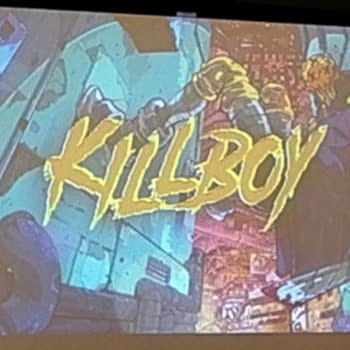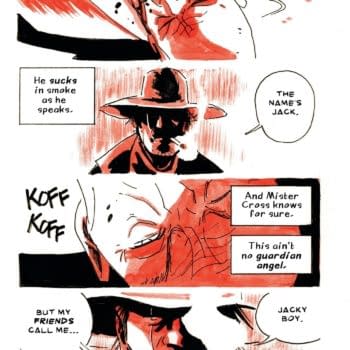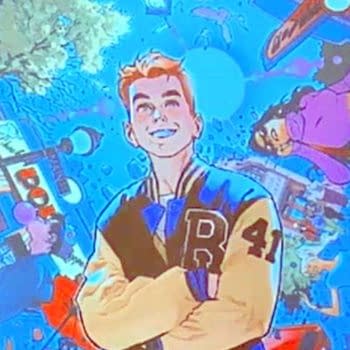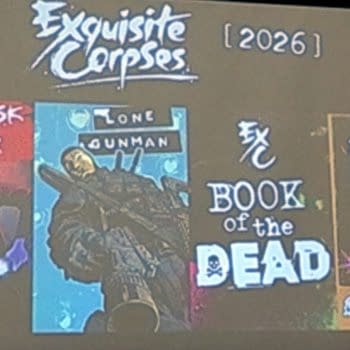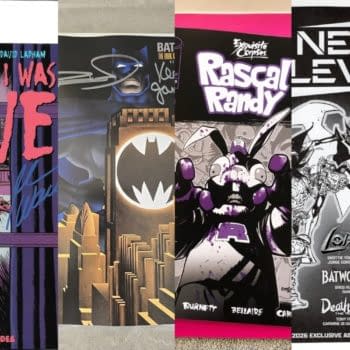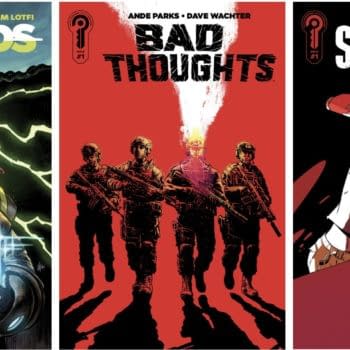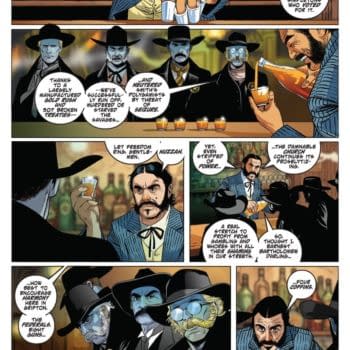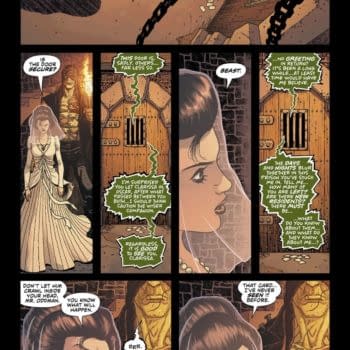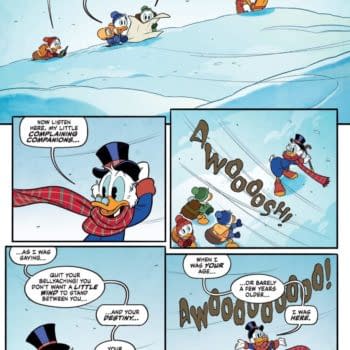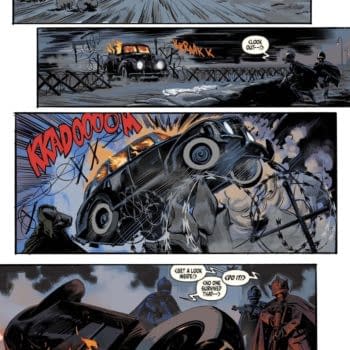Posted in: Comics, Recent Updates | Tagged: colder, dark horse, eccc, marvel, paul tobin
ECCC: Paul Tobin Gets Colder At Dark Horse

Paul Tobin is one of the most prolific and versatile writers in modern comics. From his indie work with his wife and frequent collaborator, Colleen Coover — such as Small Favors and Gingerbread Girl — to all-ages comics about Marvel Superheroes, he seems to have a foot in most areas of the industry. At Saturday's Dark Horse panel he announced a new ongoing series with a very intriguing concept. To find out more, I tracked down Tobin to talk with him about the new book, and find out more about his leap into the world of prose novels.
Yesterday, it was announced that you're on a new series for Dark Horse that has a pretty high concept behind it. Can you tell us a little about more about what we can expect from Colder?
Well, it's a horror series, but I wanted it to be a character horror series. I think — I don't like the slasher horrors, "Oh, let's see the blood everywhere!" — I like the more cerebral, tension-driven horror, where the tension develops over time. This is where the main character, Declan — known as Colder — comes in. He has this condition — I don't want to explain why he has it yet, as that's part of the mystery of the whole series — but his body temperature is going steadily down, even past what would normally be considered possible, he's actually below room temperature. It's dropping down and he's getting colder and colder. He knows that when it bottoms out that time's up and he's dead. So, the horror aspects behind it are why his body temperature is dropping, the psychological and the ticking clock elements. Also, because his origin is interwrapped with a psychosomatic drug in an insane asylum, part of the mystery is that he can actually go into someone else's insanity. If a person is insane, he can walk into their insanity and sometimes help them out and heal it, but it drives him a little insane in the process, and that's interweaving with why he's growing colder.

Well…maybe drug trip speculative! I don't know that there's any scientific basis for any of the stuff that's going on. The asylum where a lot of the main action takes place is fictional, but it's sort of interwoven with the reality of the early experiments with psychosomatic drugs and LSD extracts. That's part of the whole insanity and what's driving him insane. So, some of the science behind early drug experiments is a factual basis, but as far as the results from them… nothing scientifically proven, shall we say?
Who is the artist that you're going to be working with on this series?
It's Juan Ferrera, the guy that I've been working with on Falling Skies. We enjoyed working together so much that we decided to do something where we could actually own it ourselves and have fun that way. He was part of my choice because I enjoy working with him so much, but I noticed on our Falling Skies work that he was really good at staying consistent with the characters — even in action scenes, in subtle facial movements and things like that. That's why we brought him in on Falling Skies, because he was really able to capture the look of the actors, but still make them look believable. A lot of people who are good at capturing likenesses are only good at having them stand still and look like a photograph. But, Juan can really convey the whole range of emotions and because of the insanity and the action that's in the series, it was important for me to have an artist that could convey a lot emotionally and visually without me having to put in a caption, "Now he's feeling this particular way…". Juan can really put that forth.
Did you write the series with him in mind?
I don't think I actually had him in mind until afterwards, when the artist hunt started up. It was one of those situations where we thought about a whole list of people, and it became really obvious that Juan and I were having so much fun working together already, and that project was coming to a close, that we just wanted to keep on working together.
As you've been writing the series, and now that you know Juan is on board for the art, has that changed the possibilities for the story, or certain scenes or set-pieces that you've been able to incorporate?
I don' t know that it's changed things that much, but it's given me a lot more confidence on the project, knowing that he can back me up. I write a wealth of things and sometimes I end up working with artists who might be really good at action, but aren't good at subtle things, or people that are just fantastic at drawing figures but really not as fantastic at drawing backgrounds. But, Juan sincerely has the entire package, so I feel confident in changing scenes and settings, knowing that he will be able to capture all the necessary details, whether it's backgrounds or the subtle details of emotion. Nothing's changed, but my confidence behind the project is stronger.
You mentioned there that you write a wealth of things — I believe you're also about to release a novel, or you're working on a novel?
Prepare to Die is coming in June, and it's my first novel. It's superhero related, because I want to have a novel-writing career — I have more novels in the works, which are being shopped and worked on — but I wanted the first novel to have a little bit of a superhero base, so that my fanbase could transition over. I like some of the clichés in the superhero genre and I wanted to develop that moment that you see where the arch-nemesis has the hero down and says, "Prepare to die!" and it's a really melodramatic moment. In comics, that's the turnaround moment where the hero unveils a secret weapon or discovers new strength, but in my novel the hero is in a bad point in his life and he actually takes it as a statement and he says, "Well, how long do I have to prepare to die?" To which the nemesis says, "What do you mean?" and he's like, "You said I should prepare to die. Sounds fair. How long do I have for my preparations?" And he's given two weeks to prepare for his death. So, Reaver — the main character, Steve Clark — goes back to his hometown that he hasn't been to since he gained his powers and it becomes the story of him setting his life in order as he prepares for death.
You're a very versatile writer — you've written children's comics and you've written porn comics — it makes you very hard to pin down. Is that going to be a trend that will continue in your novels, or are you going to try to find a niche for yourself?
I like genre fiction, so if that's considered a niche, then that would be it. China Miéville is a writer that I really respect, because he tried to reinvent himself with every novel. I like that aspect, but I also like the aspect of developing and building a world in novel form. So, my basic plan right now is for the second novel — Agatha — to establish a world that I'm going to continue in my novels. They won't always focus on the main characters, but they will build upon it as a shared world. I like the continuity because then you have shorthand moments about why certain events are important. Also, from a career standpoint, sometimes series novels sell better, and I want to take advantage of that. But I have a wealth of stories that I want to tell and most of them don't fit within that world, so about half my novels may be in a shared world and the rest will be standalone narratives.
Talking about China Miéville — he's a prose writer who has been very successful and is now starting to move into comics, and you're going in the opposite direction. Do you think there's anything that comics have taught you that's going to give you more of an insight or an edge to your prose?
I think doing a wealth of writing always helps your writing and I tried to do novels for a long time and came up with some good stuff, but I really didn't come up with what I would call "cohesive novels" with good storytelling. My ideas were good, but my execution of the ideas wasn't good. Now I've written 250, maybe 300 comics and I understand a lot more about pacing, about how to develop character and things like that and, as I blocked away some time to work on novels, I could feel a huge leap forward in my ability to tell stories, and to get to the point which was a problem I had earlier in novels. I think that's what a month-after-month deadline — often I have three or four comics a month, so a week-by-week deadline — has taught me, and I've maneuvered that into novels; the ability to tell the story and get out, which I think is important so that you're not just blabbering on the page.






